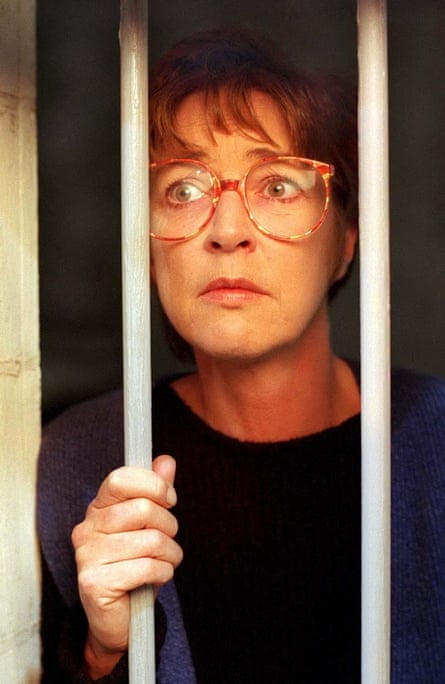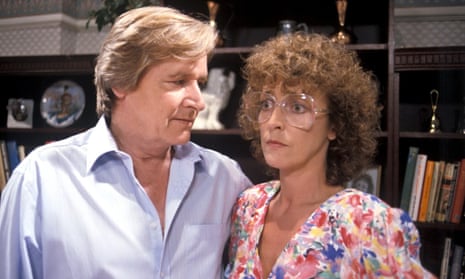The funeral of Anne Kirkbride, the actor who played Deirdre in Coronation Street, took place this week. It’s been sad, of course, seeing Kirkbride’s face in the news so much lately, because the news was that she had died at the age of just 60. She had played Deirdre since 1972, and the character had been such an integral part of British culture, we were reminded, that when she had been wrongly imprisoned some years back, even Tony Blair, then the prime minister, had implored that she be freed.
Which, indeed, was true. It wasn’t so long ago that soap operas were the dominant medium for the shaping of public debate, whether about miscarriages of justice, LGBT rights, the psychological impact of rape or drug addiction. The stars of Coronation Street were huge cultural figures – Pat Phoenix, who played Elsie Tanner, seemed as glamorous as a Hollywood movie star. At its peak, EastEnders was watched by more than half the nation’s population. Soaps were important and closely followed, by upmarket and downmarket press alike. They were part of the national conversation.
My own weekends were constructed around the Brookside omnibus; when I had children, their bathtimes couldn’t possibly coincide with EastEnders or Coronation Street. But I probably watched my last episode of any British soap the same week that the Sopranos started screening in the UK. Or when the first series of Big Brother started. Or when Frasier became available every night on the Paramount comedy channel. Something like that. The soaps became irrelevant at some point, for me and many others. They’ve become the ghosts of television past.
For me, Kirkbride’s death was a powerful reminder that soap stars seldom appear on the front pages because of what is happening in the lives of their characters any more, but rather because of the lives of the actors themselves. Kirkbride’s last public appearance had been as a character witness at the recent trial of William Roache, who had played the most enduring of Deirdre’s various love interests over the decades.

I had a look at a couple of episodes this week, for the first time in years. It wasn’t a pretty sight. Both Corrie and EastEnders seemed to be filled largely with people I’d vaguely thought had either been murdered or put in prison for murder. Poor old Les Dennis seems to be in Corrie now, when I’d imagined he might have achieved something as dignified as retirement. And while I’d heard that EastEnders was now a joyless misery-fest of untold proportions, I was still stunned by the depths of its maudlin miasma.
And the women! Tracey in Corrie was still regaling other women with her sterling advice that “you’ve got to use your feminine whatsits to get what you want”. Sue in EastEnders, who still appears to be about to marry Ian, just as she was 10 years ago, was greeting her beau’s announcement of dinner out with “check his temperature for me, Alfie. I think he may be running a fever”. Dear goodness. I remember when the soaps were matriarchies, packed with powerful, absorbing female characters – archetypes, not sad stereotypes. Or were they always bad? Did we simply know no better back then?
I refuse to believe it. The soaps did, in the past, help the nation to see itself and how it was changing. It even helped it to manage those changes. Colin and Barry did advance gay rights in EastEnders. Sue Johnston did inspire women to examine their lives in Brookside. Maybe the soaps simply assisted us in becoming more sophisticated than the people who were once happy watching soaps.
The way we consume media has changed, of course, and that’s a change that isn’t reflected in the soaps one bit. Even in the old days, soap characters watched suspiciously little television (though Brookside had a TV soap opera within the TV soap opera). Perhaps the soaps are usually full of people checking Twitter, Googling facts instead of arguing about them or playing video games instead of going to the pub. Maybe what I saw wasn’t representative. But the two half-hour episodes I watched this week were the longest periods in which I’ve seen humans not touch their smartphones for years.
Maybe it’s become hard to depict Britain on screen precisely because so much of British life is now conducted in front of a screen, or influenced by what we’ve seen on one. People are much more informed now. We talk about current affairs a great deal, when we’re not talking about which drama series to work through next. Social media alerts us to things like flags flying at half mast for a dead Saudi king – things we’d barely have been aware of before, things that shock and exercise us.
None of that is reflected on the soaps, and perhaps can’t be. I’d rather like to see some show try, though. It seems sinister, the idea that our lives have become something that can’t be dramatised, or depicted in a way we can recognise, share and discuss. Maybe there’s now so much to share and discuss so easily, under our own steam, that we just don’t need those forms and forums any longer. Whether that’s good, bad or just different I have no idea.

